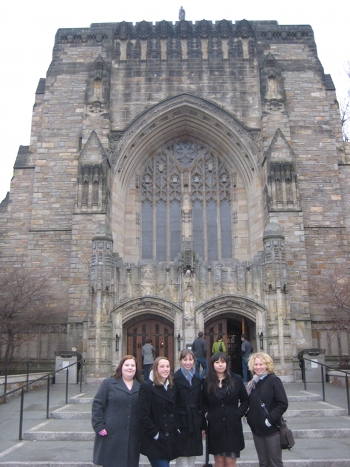Conference for Undergraduate Women in Physics
Conference for Undergraduate Women in Physics
Conference for Undergraduate Women in Physics
by Katie Booth ('11)
On January 15–17, 2010 a unique event took place at Yale: a physics conference where women finally outnumbered the men. The Conference for Undergraduate Women in Physics was first held at USC in 2006 with only 29 women attendees. Now in 2010, four conferences were held simultaneously in the West, Midwest, Northeast, and Southeast of the United States. In the Northeast, five Rowan University students attended the conference. Katie Booth (Physics and Math Junior), Emma Cortes (Physics and Pre-Med Junior), Rachel Spreng (Physics and Math Senior), Erin Pospergh (Physics and Education Senior), and Christina Branson (Math Major, Physics minor Senior) traveled to Yale to represent Rowan.
For three days, they were engaged in research talks ranging from biophysics to particle physics and tours of Science Hill and the particle accelerator. Exciting speakers like Professor Young-Kee Kim, Deputy Director of the Fermilab, and astronaut Linda Godwin shared their experiences, research interests, and encouragement. The conference was a fantastic networking and career building opportunity. Emma Cortes expressed, "It was a great chance to share research and gain feedback. I feel really motivated to continue my physics studies."
Although increasing, the number of women in the sciences, particularly physics, still remains dismal in the United States. According to the 2005 American Institute of Physics report, Women in Physics and Astronomy, only 22% of physics bachelor's degrees and 18% of physics PhD's were awarded to women in the United States. With these statistics in mind, the overall goal of the conference was to encourage female undergraduates to pursue graduate studies and careers in physics. Career and graduate studies panels provided attendees with a chance to meet both professional female physicists and graduate students. In turn, Rowan students were also able to meet physics faculty and students from Yale, MIT, Princeton and many other universities. Rachel Spreng reflects, "The conference provided an excellent opportunity to network with other women in physics and hear about current physics research. It inspired me to meet so many female physicists and to see the success attained by many of the speakers."
The conference addressed many of the issues and opposition women face by pursuing a career in the sciences: the struggle to balance family and work, negativity in the workplace, and the general rigors of graduate school. Yale hoped to foster a support group and sense of encouragement and strength for upcoming women physicists. By facing the issues, understanding how far they have come and pushing forward, women will improve their numbers in physics and continue to contribute and change the scientific community.
